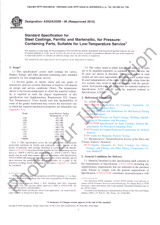Wir benötigen Ihre Einwilligung zur Verwendung der einzelnen Daten, damit Sie unter anderem Informationen zu Ihren Interessen einsehen können. Klicken Sie auf "OK", um Ihre Zustimmung zu erteilen.
ASTM G152-13(2021)
Standard Practice for Operating Open Flame Carbon Arc Light Apparatus for Exposure of Nonmetallic Materials
Name übersetzen
NORM herausgegeben am 1.6.2021
Informationen über die Norm:
Bezeichnung normen: ASTM G152-13(2021)
Ausgabedatum normen: 1.6.2021
SKU: NS-1029472
Zahl der Seiten: 10
Gewicht ca.: 30 g (0.07 Pfund)
Land: Amerikanische technische Norm
Kategorie: Technische Normen ASTM
Kategorie - ähnliche Normen:
Die Annotation des Normtextes ASTM G152-13(2021) :
Keywords:
accelerated, accelerated weathering, carbon arc, durability, exposure, laboratory weathering, light, lightfastness, nonmetallic materials, open flame carbon arc, sunshine carbon arc, temperature, ultraviolet, weathering,, ICS Number Code 19.040 (Environmental testing)
Ergänzende Informationen
| Significance and Use | ||||||||||||||
|
5.1?The use of this apparatus is intended to induce property changes associated with the end use conditions, including the effects of sunlight, moisture, and heat. These exposures may include a means to introduce moisture to the test specimen. Exposures are not intended to simulate the deterioration caused by localized weather phenomena, such as atmospheric pollution, biological attack, and saltwater exposure. Alternatively, the exposure may simulate the effects of sunlight through window glass. Typically, these exposures would include moisture in the form of humidity. Note 2:?5.2
Variation in results may be expected when operating conditions are
varied within the accepted limits of this practice. No reference,
therefore, shall be made to results from the use of this practice
unless accompanied by a report detailing the specific operating
conditions in conformance with Section 10.
5.2.1?It is recommended that a similar material of known performance, a control, be exposed simultaneously with the test specimen to provide a standard for comparative purposes. It is best practice to use control materials known to have relatively poor and good durability. It is recommended that at least three replicates of each material evaluated be exposed in each test to allow for statistical evaluation of results. |
||||||||||||||
| 1. Scope | ||||||||||||||
|
1.1?This practice covers the basic principles and operating procedures for using open flame carbon-arc light and water apparatus intended to reproduce the weathering effects that occur when materials are exposed to sunlight (either direct or through window glass) and moisture as rain or dew in actual use. This practice is limited to the procedures for obtaining, measuring, and controlling conditions of exposure. A number of exposure procedures are listed in an appendix; however, this practice does not specify the exposure conditions best suited for the material to be tested. Note 1:?Practice G151
describes performance criteria for all exposure devices that use
laboratory light sources. This practice replaces Practice
G23, which describes very
specific designs for devices used for carbon-arc exposures. The
apparatus described in Practice G23 is covered by this
practice.
1.2?Test specimens are exposed to filtered open flame carbon arc light under controlled environmental conditions. Different filters are described. 1.3?Specimen preparation and evaluation of the results are covered in methods or specifications for specific materials. General guidance is given in Practice G151 and ISO 4892-1. More specific information about methods for determining the change in properties after exposure and reporting these results is described in Practice D5870. 1.4?The values stated in SI units are to be regarded as the standard. 1.5?This standard does not purport to address all of the safety concerns, if any, associated with its use. It is the responsibility of the user of this standard to establish appropriate safety, health, and environmental practices and determine the applicability of regulatory limitations prior to use. 1.5.1?Should any ozone be generated from the operation of the light source, it shall be carried away from the test specimens and operating personnel by an exhaust system. 1.6?This practice is technically similar to ISO 4892-4. 1.7?This international standard was developed in accordance with internationally recognized principles on standardization established in the Decision on Principles for the Development of International Standards, Guides and Recommendations issued by the World Trade Organization Technical Barriers to Trade (TBT) Committee. |
||||||||||||||
| 2. Referenced Documents | ||||||||||||||
|
Empfehlungen:
Aktualisierung der technischen Normen
Wollen Sie sich sicher sein, dass Sie nur die gültigen technischen Normen verwenden?
Wir bieten Ihnen eine Lösung, die Ihnen eine Monatsübersicht über die Aktualität der von Ihnen angewandten Normen sicher stellt.
Brauchen Sie mehr Informationen? Sehen Sie sich diese Seite an.




 Cookies
Cookies
